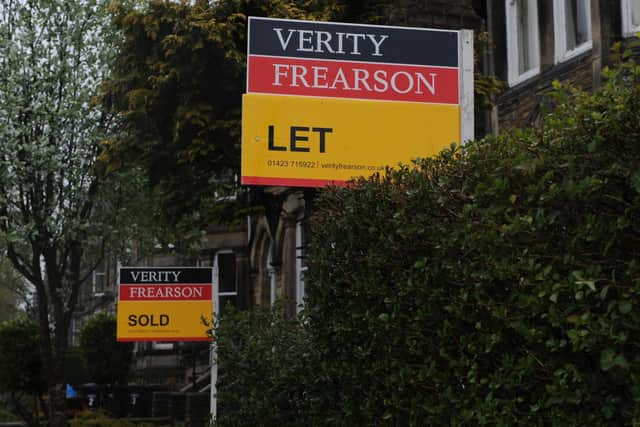Keeping the tax low on multiple sales of houses - Jenny Ross
Capital gains tax (CGT) is charged on the profit you make when selling an asset that has risen in value, so selling five rental properties at once is likely to generate a sizeable bill, considering house price growth over the past few years. But there are various ways to keep this to a minimum.
First of all, there’s the annual capital gains allowance, which means that everyone can make profits of up to £12,300 a year without having to pay any tax. This allowance has been frozen until 2026, meaning more people are likely to face a bill in the next few years as the value of their assets rise.
Advertisement
Hide AdAdvertisement
Hide AdMarried couples and civil partners can transfer assets to each other tax-free. By owning assets jointly, or transferring them from one partner to the other (which is tax-free), you’ll collectively benefit from double the CGT allowance.


You can’t carry forward any unused CGT allowance from one tax year to the next, so one of the simplest ways to reduce the amount of tax you need to pay is to spread your sales across several tax years to make the most of each year’s allowance.
Some assets are exempt from CGT altogether – including your main home – but tax on profits from selling a second home or rental property starts at a rate of 18 per cent if you’re a basic-rate taxpayer, or 28 per cent if you’re a higher-rate taxpayer.
To calculate your bill, you’ll first need to work out your ‘chargeable gain’ – in other words the amount that’s liable for tax. To do this you should not only deduct your CGT allowance from your total gain for the tax year, but also the selling costs and any costs incurred improving the property.
Advertisement
Hide AdAdvertisement
Hide AdFor example, if you bought a rental property 10 years ago for £150,000 and sold it today for £200,000, your gain would be £50,000. Once you’ve deducted your tax-free allowance of £12,300, the chargeable gain would be £37,700. Let’s say you’d also spent £10,000 on an extension – this would take your chargeable gain down to £27,700, resulting in a bill of £4,986 (basic rate), or £7,756 (higher rate).
Bear in mind that even if you’re normally a basic-rate taxpayer, you’ll need to pay the higher rate of CGT on any portion of the gain that takes you over the higher-rate threshold (£50,270).
Any losses you make during the financial year can also be deducted from your profits for CGT purposes. So if you were to sell one property for a profit of £15,000 but make a loss of £5,000 when selling another, you’ll remain within your CGT allowance of £12,300.
If you’ve lived in any of the rental properties you’re selling at any point, you can reduce your bill by claiming private residence relief. This applies for the period you lived in the property, plus the final nine months you owned it (regardless of whether you’re still living in it at that point). So if you owned a house for four years (48 months), and lived in it for the first 15 months of that, you’d be able to claim relief for a total of 24 months. This would mean that only half the gain would be liable for tax.
Advertisement
Hide AdAdvertisement
Hide AdWhile you could cut your CGT bill by moving into each of your rental properties in turn to benefit from private residence relief, you’ll need to weigh up the savings against the costs – and sheer hassle – involved in moving multiple times.
You’ll need to report and pay any tax you owe within 60 days of selling a UK property. To get help with navigating the administrative challenges of selling multiple properties – and to make sure you benefit from all the reliefs you’re entitled to – it’s worth speaking to an accountant or financial adviser.
Jenny Ross is an expert at consumer group Which?
---
Support The Yorkshire Post and become a subscriber today.
Your subscription will help us to continue to bring quality news to the people of Yorkshire. In return, you'll see fewer ads on site, get free access to our app and receive exclusive members-only offers.
So, please - if you can - pay for our work. Just £5 per month is the starting point. If you think that which we are trying to achieve is worth more, you can pay us what you think we are worth. By doing so, you will be investing in something that is becoming increasingly rare. Independent journalism that cares less about right and left and more about right and wrong. Journalism you can trust.
Thank you
James Mitchinson